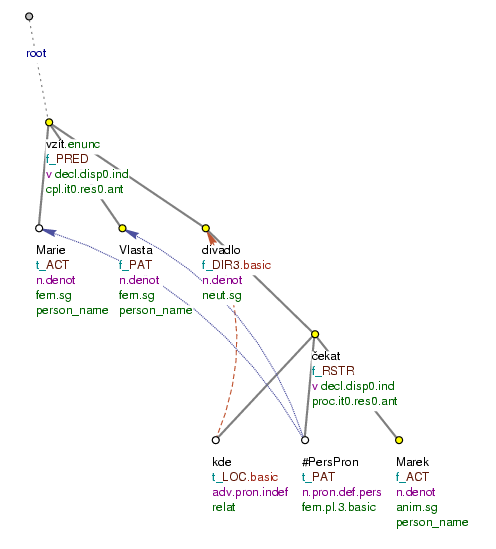Three basic types of reference are distinguished under the concept of textual coreference:
-
reference to a specific, explicit coreferred element (see Section 3.1.1, "Explicitly coreferred element"),
-
reference to a segment (see Section 3.1.2, "Reference to a segment"),
-
exophoric reference (see Section 3.1.3, "Exophora").
One speaks of explictly coreferred elements in cases where a specific sub-tree or leaf of the tectogrammatical tree for the given sentence or an adjacent sentence can be identified as the coreferred element of a pronoun.
Cf:
-
Dobiaš skoro všechno dělá s námi, jeho pověstná impulzivnost se přenáší i na nás, a to je dobře. (=Dobiaš does almost everything with us; his notorious spontaneity carries over to us as well, and that is a good thing.)
Dobiaš skoro všechno dělá s námi, jeho pověstná impulzivnost se přenáší i na nás, a to je dobře. (=Dobiaš does almost everything with us; his notorious spontaneity carries over to us as well, and that is a good thing.)
The coreferred element of the pronoun jeho (=his) (
t_lemma=#PersPron) is the expression Dobiaš (=Dobiaš) (a leaf of the tree). The coreferred element of the pronoun to (=that) is the entire clause jeho pověstná impulzivnost se přenáší i na nás (=his notorious spontaneity carries over to us as well) (a sub-tree). Cf. Fig. 9.89.
The explicitly coreferred element is represented by the attribute coref_text.rf, containing identifiers of the target nodes (see Section 1, "Representing coreference in the tectogrammatical trees").
In accordance with the opportunities to refer to the respective parts of the tectogrammatical tree, the following cases of explicit coreferred elements are found (see also Section 1, "Representing coreference in the tectogrammatical trees"):
-
the coreferred element is a leaf of the tectogrammatical tree. Cf.:
-
Myslíte, že rozhodnutí NATO, zda se {
#PersPron} rozšíří, či nikoli, bude záviset na postoji Ruska? (=Do you think that NATO's decision whether it will expand or not will depend on Russia's attitude?)The coreferred element of the elided personal pronoun for the subject, represented by the node t-lemma
#PersPron, is a leaf of the tree, the node for the word NATO. Cf. Fig. 9.90.
-
-
the coreferred element is the root of the sub-tree.
The governing node of a sub-tree is the coreferred element in three cases:
-
the coreferred element is the root of the sub-tree only (without daughter nodes);
-
the coreferred element is the entire sub-tree;
-
the coreferred element is the root of the sub-tree and only certain daughter nodes of this governing node (not the entire sub-tree).
We are aware of the semantic shifts this can give rise to, and we adopt this solution for reasons of a lack of more adequate resources.
Cf. the examples:
-
Ale je něco jiného, když je někdo podnikatel a pak jde do politiky, anebo jestli někoho politické změny vynesou na špičku a on toho pak využívá k hospodářské činnosti a zastává vysoké funkce ve velkých firmách. (=But it is a different matter if someone is a businessman and then goes into politics, or if someone is brought to prominence by political changes and he then takes advantage of this for business activities and occupies senior positions in large companies.)
The coreferred element of the pronoun toho (=(of) this) is the dependent clause jestli někoho politické změny vynesou na špičku (=if someone is brought to prominence by political changes). The effective root of this dependent clause, the node for the verb vynést, is identified as the coreferred element. Cf. Fig. 9.91.
-
Generál kromě toho připravuje nařízení, podle něhož se na něj budou moci obrátit všichni, kteří se domnívají, že se jim děje bezpráví; hodlá tím předejít tomu, aby se redukce armády stala záminkou k vyřizování účtů. (=Furthermore, the general is preparing a directive which will enable all those who consider they are suffering injustice to approach him; in doing so he intends to prevent reductions in the army being used as an excuse to settle accounts.)
The coreferred element of the pronoun tím (=(by) this) is the entire sentence Generál kromě toho připravuje nařízení, podle něhož se na něj budou moci obrátit všichni, kteří se domnívají, že se jim děje bezpráví. (=Furthermore, the general is preparing a directive which will enable all those who consider they are suffering injustice to approach him.) The effective root of this sentence, the node for the verb připravovat (=to prepare) is identified as the coreferred element. Cf. Fig. 9.92.
-
-
Two nodes of the tectogrammatical tree are the coreferred element. Cf.:
-
Marie vzala Vlastu do divadla, kde na ně čekal Marek. (=Marie took Vlasta to the theatre, where Marek was waiting for them.)
The coreferred element of the personal pronoun na ně (=for them) (represented in the tectogrammatical tree by a node with the t-lemma
#PersPron) is both nodes (Marie and Vlasta), which must be referenced separately. Cf. Fig. 9.93.
This is a temporary technical solution, which is also customary in constructions with hypotactic coordination of the tatínek s maminkou (=daddy and mummy) type; see Section 5.2.1, "Referring to a modification with the
IDfunctor". -
Figure 9.89. Explicit coreferred element
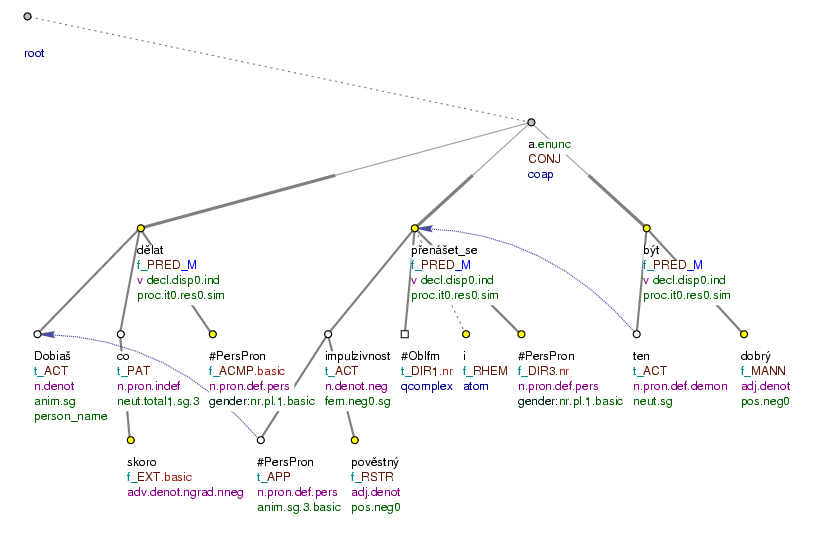
Dobiaš skoro všechno dělá s námi, jeho pověstná impulzivnost se přenáší i na nás, a to je dobře. (=lit. Dobiaš almost everything does with us; his notorious spontaneity REFL carries_over also to us, and that is good.)
Figure 9.90. Explicit coreferred element
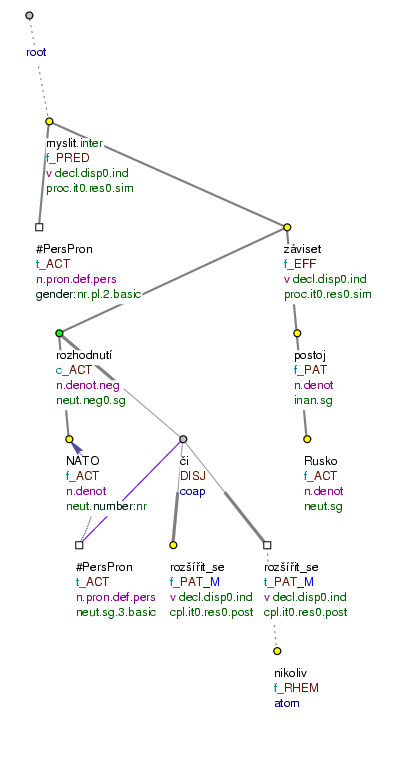
Myslíte, že rozhodnutí NATO, zda se rozšíří, či nikoli, bude záviset na postoji Ruska? (=lit. Do_you_think that decision (of) NATO whether (it) REFL will_expand or not will depend on attitude (of) Russia?)
Figure 9.91. Explicit coreferred element
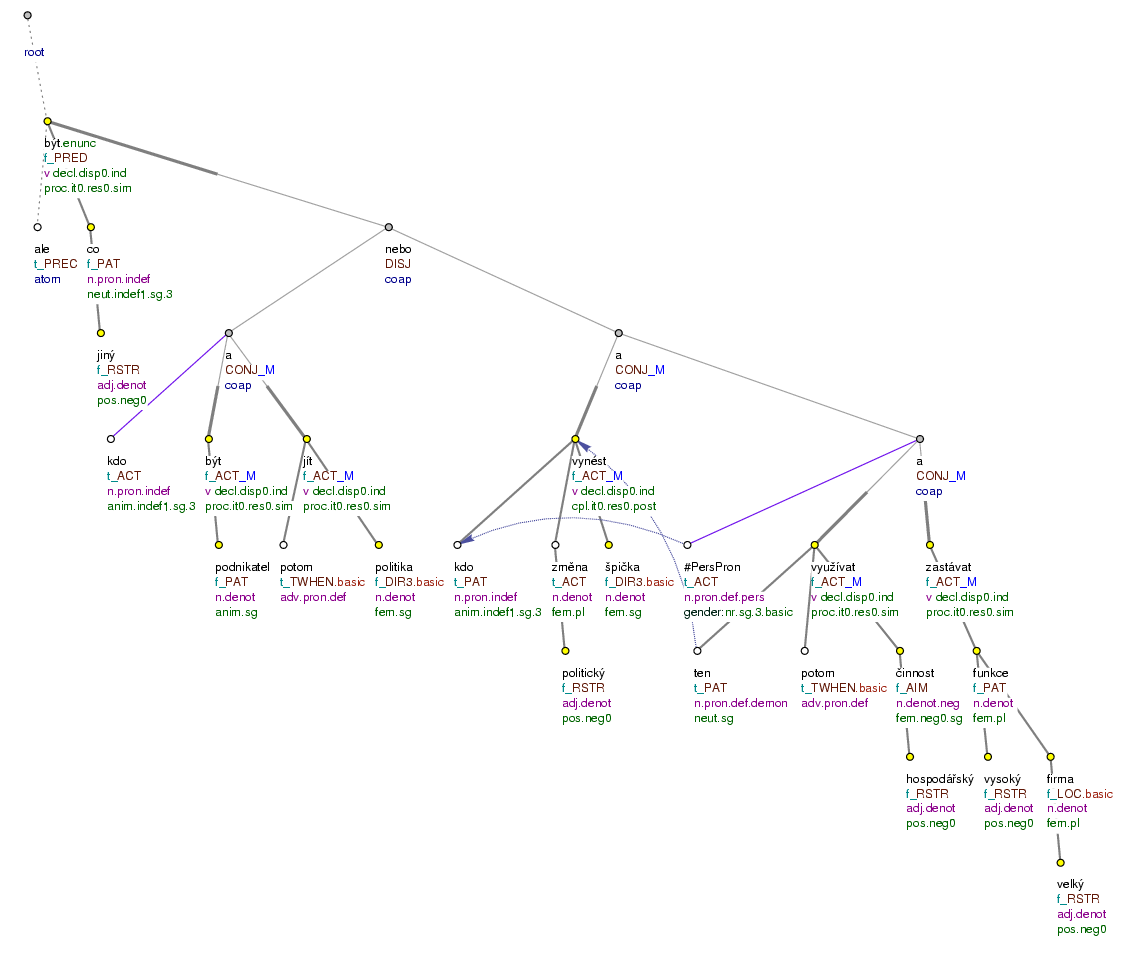
Ale je něco jiného, když je někdo podnikatel a pak jde do politiky, anebo jestli někoho politické změny vynesou na špičku a on toho pak využívá k hospodářské činnosti a zastává vysoké funkce ve velkých firmách. (=lit. But (it) is something else if is someone (a) businessman and then goes into politics, or if someone.ACC political changes.NOM bring to prominence and he this then takes_advantage_of for business activities and occupies senior positions in large companies.)
Figure 9.92. Explicit coreferred element
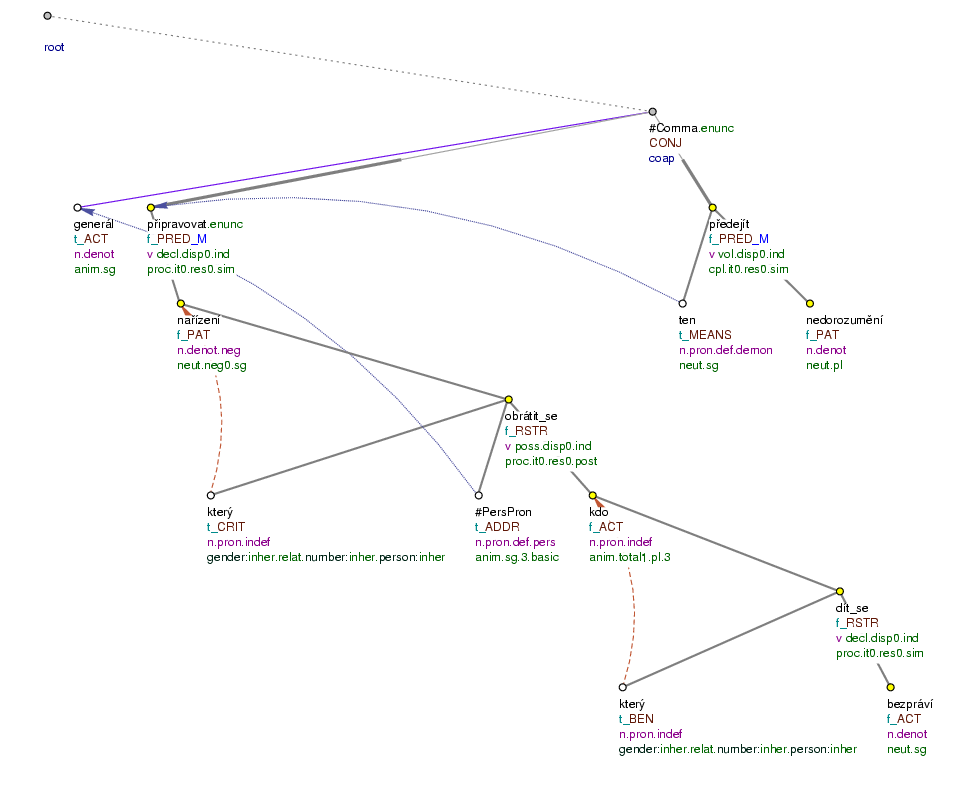
Generál připravuje nařízení, podle něhož se na něj budou moci obrátit všichni, kterým se děje bezpráví, hodlá tím předejít nedorozuměním. (=lit. (The) general is_preparing (a) directive according to_which REFL at him will_be able to_turn all_those who REFL is_happening injustice; (he) intends by_that to_prevent (from) understanding.)
One speaks of reference to a segment in cases where a pronoun refers to a substantial section of a text.
Reference to a segment is represented by the attribute coref_special, in which the value segm is entered.
This concerns the following cases:
-
the coreferred element comprises two or more specific sentences. This mainly involves a simple enumeration of items, a collection of consecutive sentences. They are not referenced separately, but all together, as a unit. Cf.:
-
Rozprava o podobě reformy veřejných financí bude zahájena ve středu. Všechna jednání proběhnou za zavřenými dveřmi. Lidovým novinám to sdělil včera ministr financí. (=The discussion about the nature of the reform of public finance will begin on Wednesday. All negotiations will take place behind closed doors. Lidové noviny (The People's Daily) was informed of this yesterday by the Finance Minister.)
The pronoun to (=this) in the final sentencce refers to both preceding sentences. In the attribute
coref_special, at the node for the pronoun to (=this), the valuesegmwill be entered.
Additional example:
Podle Kohla nelze zapomenout na to, že Německo přepadlo 22. června 1941 Sovětský svaz. Němci jménem Německa přivodili ruskému lidu nesmírné utrpení. Stejně tak nelze zapomenout, co Rusové později způsobili Němcům. Z toho [
coref_special=segm] všeho si chceme vzít společné poučení. (=According to Kohl, one must not be allowed to forget that on 22nd June 1941 Germany attacked the Soviet Union. The Germans, in the name of Germany, inflicted tremendous suffering on the Russian people. Likewise one must not be allowed to forget what the Russians later did to the Germans. We wish to draw our shared lessons from all of this.) -
-
the coreferred element cannot be identified as a specific node, but by inference it can be deduced from a segment of text, on the basis of the context. Cf.:
-
Předsedové a ekonomové družstev už jsou nachystaní na likvidaci dlužníků. Řekněme, že přijdou za vlastníkem 25 ha v družstvu. Každý ten hektar má hodnotu okolo 100 tisíc. Banka nabídne 10 tisíc za hektar a vlastníkovi nezbude nic jiného než to prodat, protože nazítří mu banka nabídne už třeba jen 8 tisíc. Chci tím říci, že nebude všechno v transformačním procesu úplně čisté. (=The chairmen and economists in the cooperatives are already prepared to liquidate their debtors. Let us say that each owner has 25 hectares in the cooperative. Each hectare has a value of around 100 thousand. The bank will offer 10 thousand per hectare and the owner will have no other option than to sell, because on the following day the bank will then offer, say, only 8 thousand. By this I want to say that nothing in the transformation process will be entirely pure.)
The pronoun tím (=by this) in the final sentence refers to the preceding segment of the text. In the attribute
coref_special, at the node for the pronoun tím (=by this), the valuesegmwill be entered.
Additional example:
Potentáti v bance koupí za deset, prodají si za patnáct. Ale povede to k rychlému přerodu. Zmizí výměry kolem 25 ha, přibude vlastníků kolem 500. Odhaduji, že do dvou let budou schopni splatit bance dluh a třetím rokem už budou dělat na sebe. A na práci najmou jen schopné lidi, bude to v jejich zájmu. Kdo to pochopil, má náskok. [
coref_special=segm] (=The potentates in the bank will buy for ten, and sell for fifteen. But this will lead to a rapid rebirth. Holdings of around 25 hectares will disappear and there will be around 500 more owners. I estimate that within two years they will be in a position to pay off their debt to the bank and in the third year they will work for themselves. And they will employ only capable people - it will be in their interest. Those who understand this will have an advantage.) -
In exophora a pronoun refers to situations or reality external to the text.
Exophoric reference is represented by the attribute coref_special, which contains the value exoph.
Cf.:
-
V období vrcholícího léta roku 1939 již málokdo v Evropě mohl uvěřit nadějeplným slovům britského ministerského předsedy Chamberlaina, proneseným z balkonu Buckinghamského paláce po návratu z Mnichova: Myslím, že je to mír na celou naši dobu. (=After the critical summer months of 1939 hardly anyone in Europe could now lend credence to the optimistic words of the British prime minister Chamberlain spoken from the balcony of Buckingham Palace on his return from Munich: I believe it is peace in our time.)
The pronoun to (=it) in the final sentence refers to a reality beyond the text, the Munich agreement. In the attribute
coref_special, at the node for the pronoun to (=it), the valueexophwill be entered.
